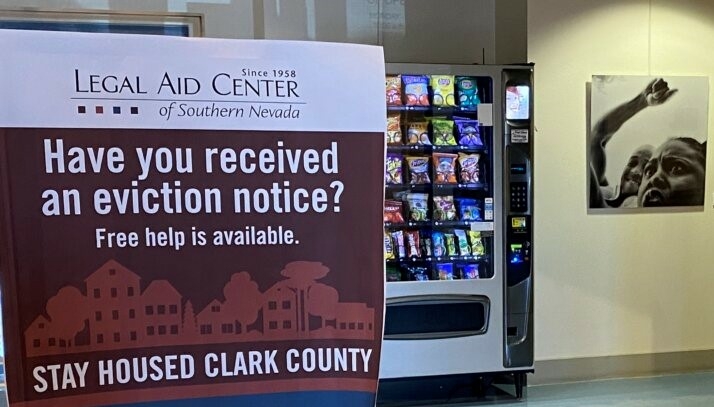Flipping NV’s unique eviction process, bill would make landlords, not tenants, file in court first

For multiple legislative sessions, lawmakers have offered modest proposals to prevent evictions. They stood up a pandemic-related mediation program and rental assistance programs, slightly extended the time frame before lockouts, and enacted legislation to automatically seal some records
But Nevada’s summary eviction process itself, a system unique to the state that has been maligned by legal groups for requiring tenants be the first to file with the court after receiving a paper notice from landlords, largely remained intact.
Lawmakers took a first step Wednesday to consider switching the process to require landlords first file with a court before evicting a tenant.
Assembly Bill 340, which was heard by the Assembly Judiciary Committee on Wednesday, is being sponsored by Democratic Assemblywoman Shondra Summers-Armstrong.
Since the pandemic, she said some of the top concerns among her constituents have been evictions and the uncertainty of navigating a confusing and quick system.
“They sent me here to do something about this issue and I promised that I would try,” she said as she struggled to fight back tears. “I know this is hard, and I know there is a bunch of push back, but we can’t have a process, in my opinion, that is more fair, equitable and clear for multimillion dollar businesses to fight with one another than it is for regular people to stay housed.”
Legislation to overhaul the eviction process was briefly considered during the 2021 legislative session but repurposed into an interim study.
Las Vegas Justice Court Judge Melissa Saragosa told lawmakers during an Interim Judiciary Committee hearing in 2022 that her vision was that “landlords would have to file the notice of eviction with the court before it is served.”
Jonathan Norman, the statewide advocacy, outreach and policy director for Nevada Coalition of Legal Service Providers, testifying alongside Summers-Armstrong as the legislation was presented Wednesday, said while AB 340 might be lengthy, the purpose “is really simple.”
“This bill would require the first document filed with the court in a summary eviction action to be a complaint followed by a response from the tenant,” he said.
Under the proposed legislation, the landlord would serve a seven day pay or quit notice to tenants, who comply by either paying rent or vacating the property.
After seven days, Norman said the landlord would then file with the court requesting to evict the tenant, who is then served and has 10 days to file an answer. The tenant could file an answer to secure a court date or face eviction if they fail to respond.
“If the eviction is granted, that order is transmitted to the constable’s office, the landlord pays the fee and a 24 hours lockout notice is posted on the door,” he said.
The law, if passed, wouldn’t prevent landlords from evicting tenants. The legislation, Norman added, doesn’t stop constables from carrying out lock notices if evictions are granted.
Summers-Armstrong said the law would provide due process for people.
“The purpose of this bill is very simple and that’s to bring the process of summary eviction in line with all other civil matters that are heard within the state of Nevada,” she said.
Assembly Speaker Steve Yeager, who doesn’t sit on the Judiciary Committee but popped into the hearing to ask questions about the bill, asked about data collection on evictions.
Lawmakers on the committee asked similar questions about data on lockouts and notices.
“One of the issues we’ve had over the years in this committee is it’s hard to know how many people are getting served with notices and vacating the premises or remedy the problem,” Yeager said.
While the proposal wouldn’t capture all the pay or quit notices landlords give tenants, it would at least allow for some data collection of how many complaints are filed in the courts by landlords, Norman said.
“I wouldn’t wish this on anyone”
For the past several months since being evicted, Kimberly Ireland, a Culinary Union member who testified Wednesday, has struggled to maintain secure housing for her two children and grandson.
Since January, the family “bounced around from weekly rentals to short term rentals,” she said.
After contracting Covid last year, Ireland was unable to return to work and fell behind on rent.
She qualified for and received CARES Housing Assistance Program (CHAP), which used federal relief funding to provide rental assistance in Clark County.
An estimated $300 million in rental assistance helped about 60,000 households pay back-rent. However, large-scale rental assistance ended in January.
“Once the funds were exhausted, my landlord no longer wanted to work with me,” she said.
Ireland was among the handful of people who shared their experiences dealing with the eviction process.
“This eviction process is something I wouldn’t wish on anyone,” she said. “It is imperative we do something about the eviction process.”
Legal providers and social service groups have warned Nevada could face an influx of evictions as large scale rental assistance, funded through federal dollars, has mostly dried up.
Civil Law Self-Help Center, which is operated by the Legal Aid Center of Southern Nevada and helps people with legal paperwork, has seen record numbers of people needing assistance.
Former Assemblywoman Maggie Carlton, the executive director for the United Labor Agency of Nevada, which provides rental assistance, testified in support. She told lawmakers AB 340 would give nonprofits more time to help folks in need.
“We are in a housing crisis but we are also in a homeless crisis,” Carlton said. “The way to keep people from becoming homeless is to keep them in their homes and help them pay their rent and walk them through this process.”
Lilith Baran, the policy director ofor the ACLU of Nevada, likened Nevada’s current eviction system to a bleeding artery that leads to homelessness.
“This is an incredibly important piece of legislation that unfortunately we had the opportunity to do something about in the previous session,” she said.
Baran, who also serves as the board president of the Reno Initiative for Shelter and Equality, which provides emergency shelter in Reno, said “most of our families are in the shelters because of the summary eviction process.”
The Nevada State Apartment Association, Nevada Realtors and the Vegas Chamber opposed the legislation.
John Sande, a lobbyist with the Nevada State Apartment Association, argued the bill would impact “the cost of affordability of housing.”
“Housing in our state is an ecosystem,” he said. “If we increase costs within the ecosystem it will spread throughout. In this case, those costs will be incurred by existing and new tenants through higher rents.”
While saying it was a step in the right direction, Nevadans for the Common Good, a faith-based coalition that organizes on social justice issues, testified in neutral, saying the bill should go even further in protecting tenants.
Barbara Paulsen with the group said they support “the intent of AB304 to change the process of summary eviction” but added that “changes are needed in the bill” that require guidance for tenants on how to respond to the court.








